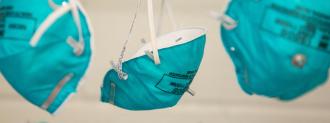Supply shortages during the COVID-19 pandemic have left many healthcare workers with little choice but to reuse their coronavirus masks — even though N95 respirators are typically only designed for a single use.
Now, to help those workers stay as safe as possible, a group of researchers has launched a website breaking down all the available data on mask decontamination for quick consumption.
“We aim to provide information and evidence in this critical time to help decision-makers make risk-management decisions, given the specific conditions and limitations they face,” the group said in a statement.
Reusing Coronavirus Masks
Even before the COVID-19 pandemic had hospitals running low on new coronavirus masks, researchers had already published a wealth of studies on the subject of decontamination and reuse.
In recent months, the number of papers and reports has increased significantly, as even more experts turn their attention to helping hospitals cope with the coronavirus pandemic.
So, the research was already available, but those on the frontlines of the COVID-19 battle don’t have time to read through it to figure out how they should be decontaminating their coronavirus masks.
That’s where this new website comes into play.
They focused on 3 decontamination methods — treatment with heat and humidity, ultraviolet-C light, and hydrogen peroxide vapors.
Over the past two weeks, a group of more than 60 scientists, engineers, and students sifted through all of that available research.
They honed in on three well-studied methods for mask decontamination — treatment with heat and humidity, ultraviolet-C light, and hydrogen peroxide vapors — and summarized the available information on each method in a technical report.
They also prepared a one-page fact sheet on each method.
These sheets break down the method’s efficacy at killing the coronavirus, potential impact on mask integrity, and other key considerations. They also highlight reference documents for implementing the specific method for mask decontamination.
On April 1, the group launched N95decon.org, a website hosting all of these documents so that anyone who needs information on reusing coronavirus masks will have easy access to it.
“This effort is motivated by our deep appreciation and gratitude for the workers at the frontlines of this pandemic,” the group wrote on the website.
“We wish to convey that the scientific community is working to support them by exploring and mobilizing scientific literature and research teams to provide data-backed solutions against threats to their health and safety,” it added.
Mask Decontamination During COVID-19
The group plans to keep updating the website as new information on mask decontamination becomes available — and that information is coming at a breakneck pace right now.
Researchers from Duke University confirmed on March 26 that a vaporized hydrogen peroxide-based decontamination method developed for lab equipment is effective on coronavirus masks — all three Duke Health hospitals are now using it.
Even more recently, on March 29, the FDA issued an Emergency Use Authorization to Ohio-based nonprofit Battelle for its own vaporized hydrogen peroxide-based technology, which it used to decontaminate 3,500 coronavirus masks the very next day.
Material scientist Peter Tsai, meanwhile, is in the midst of conducting new research on the use of heat to kill the coronavirus on masks, and he told VICE on April 1 that he expects to have results within the next day or two.
The current shortage of coronavirus masks and other supplies is not only far from ideal — it’s shameful that the people on the frontlines of this pandemic are forced to cut corners when it comes to protecting their own health.
But until the shortage of new masks is resolved, either by permitting new manufacturing or importing masks from overseas, healthcare workers are going to continue to reuse the ones they have — and the efforts of these groups will ensure they do so in the safest way possible.






